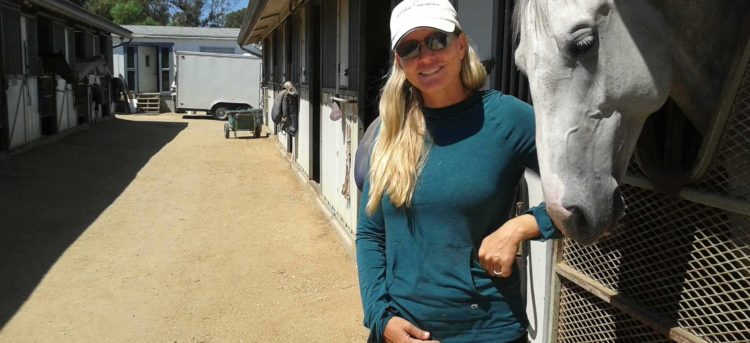What has four legs, a long tail, and are measured in hands? Of course the answer is the horse, the central aspect of an industry that touches agriculture, business, sport, gaming, entertainment and recreation. From the weekend trail rider to the hard core horse competitor, the horse industry is directly responsible for infusing nearly $40 billion a year into the national economy, according to the American Horse Council. However, for Erin Isom, owner of both Alderin Sporthorses and Palos Verdes Stables, the horse industry is also a career path she has trotted down since she was 10 years old. Starting out with an empty barn, a complete understanding of horses, and an unconquerable spirit, Erin has grown her business into one of the most profitable barns and training facilities in California. Today, she has more than 35 regular students that she teaches six days a week, and is responsible for the oversight of more than 78 individual horses that she boards at her Palos Verdes Stables. She also leases, sells and purchases horses as a symbiotic component to her business model.
The Start
I’m a trainer, barn manager, horse rider. I’ve been managing a barn since I was 12 and training since I was 16 years old. So I’ve been doing this for 27 years. The parent company is HGS Inc., and it is the entity under which we buy, sell, and lease horses. Then under HGS is Alderin Sporthorses. This company trains, manages, and instructs riders, either individually or in groups. Finally, there is the barn itself, which is a very profitable component to the business, which is called the Palos Verdes Stables. It’s confusing to a lot of people, but it’s the way it’s set up.
How did you get started with your business?
I was a horse rider, horse trainer and competitor in Palos Verdes since before I was a teenager. Then when I turned 22, I was offered a job to manage a stable in Arizona. I did that for two years. It was a 55-horse stable. When I showed up there were only 7 horses, because there was another trainer also working there. Three weeks later she died in a car accident, and I had zero horses. But through advertising myself as a trainer, I filled my stalls. I had 56 horses in 8 months, more than any other stable in the area.
When I was growing up, I was never given a thoroughbred. My parents bought me a trail horse, but I wanted to jump. So when I was 12, I had this little quarter horse that I taught to jump. Then I sold it and started to buy racehorses off the track, trained them and sold them for $5,000 – $10,000. As a trainer, from the ages of 14 – 17 years old, I bought and sold horses so I could buy a competitive jumping horse to compete on. I was one of the top 10 jumpers in the country when I was 17 years old. Now, I currently have 78 horses.
How did you fund your business in the beginning?
In the beginning, I self funded everything, mostly by working my butt off in the stables, and making a name for myself as a competitor and trainer. My husband helped me with the structure and financing of my business. It’s what he does.
Running the Business
How did you learn to run your business?
I guess the time I really started to learn the business of training was when my trainer hired me to be her assistant trainer. I was 16 and I decided from that day that I was going to be the best doggone horse trainer I could be.
Who was your first customer?
I brought my first client from Arizona. But I was born with horses. There was a neighbor who hired me as a horse trainer when I was 14, so she really helped me get started. I still consider her my first client.
What’s the biggest mistake you made in the first year?
One of the biggest mistakes I ever made was only relying on verbal agreements and not having paperwork to legitimize an agreement. Now I am almost militant about paperwork and contracts. I learned this really well when I went to Arizona when I was 22 years old. The owner of the stable promised me 25 percent equity of the property and a wage for five years. Within five months, he dropped my wage and after two years he sold the property along with the business I had developed, and didn’t give me a dime. That was a big lesson for me to always get things in writing.
But I don’t regret it. It was a mistake, but it was also an important opportunity that allowed me to open a stable here in Palos Verdes.
What’s the smartest thing you did in the first year?
The smartest thing I did here and every barn I ever worked at was to always take full advantage of any opportunity that came my way. For example being able to go to Arizona gave me a great opportunity to learn how to manage a stable. To this day, I take every opportunity to grow and I never close the door. This even applies to horses. I look at the purpose behind training each individual horse and each individual rider.
The other really smart move I made was to create Alderin Horses. This component of my business is really profitable. You have to understand that a lot of people in the stable business are really greedy. Trainers are what make barns fail, but they are also the reason behind their success. So there is an inherent conflict between the barn business and the training business. But under the barn management company of HGS and the training company of Alderin, I can bring harmony between both elements of the horse training industry. As the barn manager, I make sure all the money goes back into supporting the barn. It is really common for trainers to find ways to hide a lot of money from the barn side of the operation, and this is why a lot of barns fail.
What’s the most rewarding thing about running your own business?
The reward is really my purpose. The better trained and better behaved each horse I receive in my barn, the better life that horse will have. A bad and untrained horse will have a bad life.
The other reward I get is from teaching my students. I have 30 students, and I want what they want. I have learned to not want it more than what they want, but if they want it, I will find a way to allow these kids to achieve their dreams. Because of this passion I am not just a horse instructor, I am a trainer, still competing and still winning. I share this passion with my students and, for sure, this is rewarding to me.
What’s the most difficult/challenging thing about running your own business?
The biggest challenge I face is dealing with the people who board their horses here. This is a very exclusive area, and I have a hard time dealing with the idea of entitlement. A lot of the people who bring their horses here feel they are special. They are always complaining about something or other because they think they are special and privileged. Another challenge I have is explaining to people who I train not to take advice from other boarders. They are usually wrong, and it diminishes my impact as a trainer.
What’s the most surprising thing about running your own business?
I am always surprised to see how parents try to posture and position their children. This surprises me because I see it in cheerleading, the PTA and other groups. This idea that people come here thinking they are more special than someone else constantly surprises me. Like I said, I have more than 75 horses here and somebody told me that they want their horse stall cleaned first— before anyone else. We have a system here, and it can’t be changed. Then I told them that if they would like to move their stall to the one that is cleaned first, that would be OK. She was appalled that I would suggest such a thing. She felt entitled and special and I deal with it all the time. But I know that the key to a successful business is to not let negative or distracting situations interfere with your business model.
What business owner or entrepreneur do you admire most? Who is your role model?
Judy Martin for sure. She is a lady that used to own Seahorse Stables here in Palos Verdes. She built the stable from nothing into a very successful barn that produces Olympic riders. I’ve been told that I am a young Judy Martin. I really admire her.
What I’ve Learned
If you could go back to when you were starting your business, what advice would you give yourself?
The advice I would give myself is to put more value on my services, and don’t give it away for less than it’s worth. The other thing is do not give attention to “greasy” people. I call them “greasy” because of the expression the “squeaky wheel gets the grease.” Don’t let these people take away from your really good customers. One day I woke up and realized that one person who was nickel and diming me to death, and not appreciating what I am providing, was taking away hours of my day and making me worry at night. By comparison, I have another customer who doesn’t say a word, rents from me for years, pays each month without a problem. I realized that I was spending more time with the complainers than I was with my really good clients.
What do you wish you had known before you had started your business?
I really learned everything the hard way. I think because I was around horses my whole life, I learned the necessary skills from the time I was 12 years old. However, if I did know something now that I didn’t know then, it would be that I create the value in my business. I didn’t know it! I didn’t know that I create value. Some people know it but I didn’t. There is a reason why one pair of jeans is more valuable than another. There is a value proposition and I didn’t learn that until later on in life. I bring a value to people lives through their horses.
About Palos Verdes Stables
Address: 4057 Vía Opata, Palos Verdes Estates, CA 90274
Phone:(310) 378-3527
This article was originally written on October 24, 2014 and updated on November 3, 2016.


Have at it! We'd love to hear from you and encourage a lively discussion among our users. Please help us keep our site clean and protect yourself. Refrain from posting overtly promotional content, and avoid disclosing personal information such as bank account or phone numbers.
Reviews Disclosure: The responses below are not provided or commissioned by the credit card, financing and service companies that appear on this site. Responses have not been reviewed, approved or otherwise endorsed by the credit card, financing and service companies and it is not their responsibility to ensure all posts and/or questions are answered.